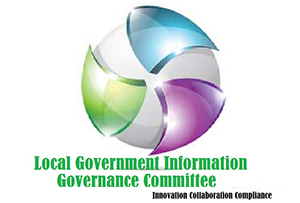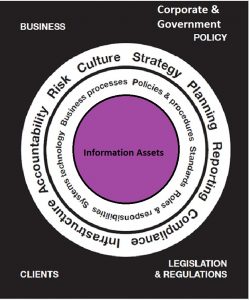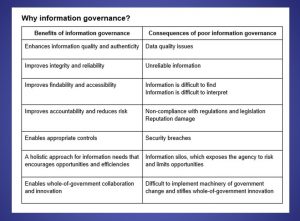What is Information Governance?
According to National Archives Australia, “Information governance is an approach to managing information assets across an entire organisation to support its business outcomes. It involves having frameworks, policies, processes, standards, roles and controls in place to meet regulatory, legal, risk and operational requirements. Information governance is an essential element of corporate governance that must be aligned with business outcomes and risks.”
An essential part of good governance is having an information governance framework in place within your agency.
A visual representation of the components of an information governance framework.
The key components of success include:-
1. Senior management support and leader. This can be in the form of establishing an information governance committee, or standard reporting to the Senior Management Team with Corporate Services Director sponsorship
2. Know your legal, regulatory, risk and business context for your organisation’s information assets
3. Planned and confirmed resources for information infrastructure planning and management
4. All information strategies and policies aligned to your agency’s business
5. Example and embed a culture that values information
6. Communicate clear guiding principles which reflect an approach and commitment to creating and managing information
7. Identify information assets by conducting an information review – An Information Asset Register should be the outcome that provides a foundation for future development and management of your information assets.
8. Assess business system functionality against standards to consider business information needs, risks and opportunities – capture key data into your Information Asset Register
9. Implement an information management workforce plan aligned to the Digital information and records management capability matrix (this is available from the NAA website)
10. Document your information governance framework – which will include of the findings, decisions, goals and actions from the above.
Work achieved in 2017 workshops with eAssure resulted in the following documents to help support your information governance development https://lgig.com.au/information-governance-toolkit/
For more information on Information Governance go to http://naa.gov.au/


